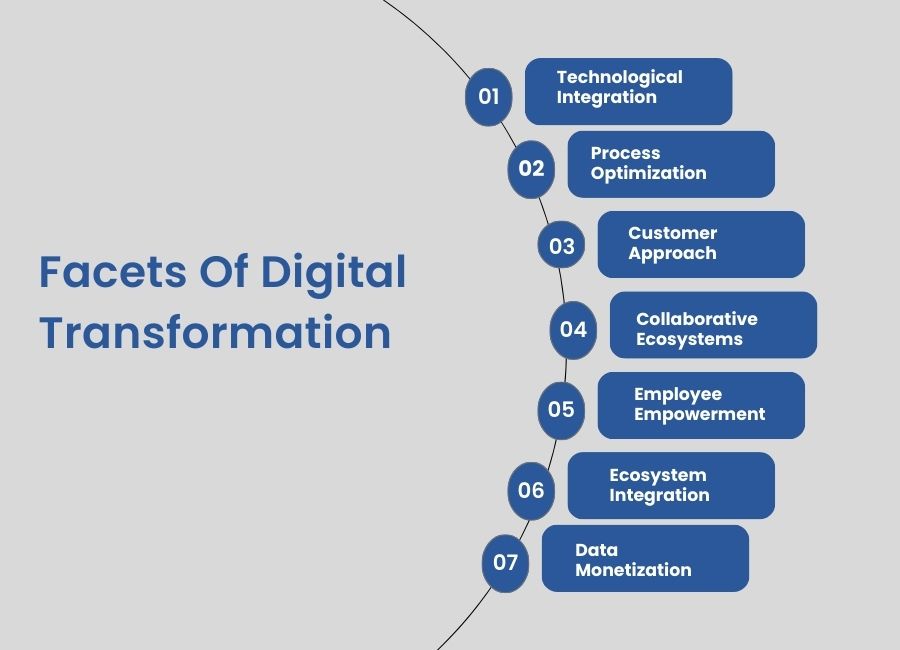 March 31, 2023
March 31, 2023

In recent years, the term “Digital Transformation” has become a buzzword in the business world. Many organizations are investing heavily in technology to enhance their operations, and their customers’ experience, and to secure a leading position in this competitive environment. However, digital transformation is more than just technology. It is a strategic initiative that involves transforming the entire organization, its processes, culture, and mindset, to adapt to the digital age. In this blog post, we will explore why digital transformation is more than just technology, and why organizations need to approach it as a holistic business transformation.
Digital transformation is the integration of digital technology into all areas of a business, resulting in fundamental changes to how the business operates and delivers value to its customers. It involves the use of technology to streamline processes, automate tasks, enhance customer experience, and improve business outcomes. Digital transformation is not just about adopting new technology, but it is also about changing the work style of people, the culture of the organization, and the approach in which a business interacts with its customers.

In the dynamic realm of digital transformation, the spotlight often falls on the technological advancements that drive innovation and change. However, beyond the realm of code and circuits lies a profound and often overlooked dimension – the non-technical facets of this transformational journey.
Digital transformation involves aligning the company’s goals and objectives with its digital strategy, which requires a deep understanding of the company’s processes, customers, and employees. Digital transformation involves evaluating the company’s current state, identifying areas that need improvement, and then defining a roadmap to achieve the desired state. This strategic approach to digital transformation ensures that the technology is used to create real business value.
Digital technology has revolutionized the way customers interact with businesses, and they expect a seamless and personalized experience across all touchpoints. Companies that invest in digital transformation can create a better customer experience by leveraging data and analytics to gain insights into customer behavior and preferences and then using this data to personalize interactions, provide faster response times, and deliver a consistent experience across channels. By improving the customer experience, companies can increase customer loyalty, drive revenue growth, and gain a competitive advantage.
By using digital technologies, companies can streamline their processes, eliminate manual tasks, reduce errors, and improve efficiency. For example, automation can help companies reduce manual data entry, increase accuracy, and free up employees to focus on higher-value tasks. Data analytics can help companies identify bottlenecks in their processes and optimize them for better efficiency. By improving processes, companies can reduce costs, increase productivity, and improve the overall customer experience significantly.
Digital transformation is not just about implementing new technologies but also about fostering innovation. By leveraging digital technologies, companies can create new products and services, enter new markets, and disrupt existing business models. Digital transformation enables companies to experiment with new ideas and learn quickly, which is essential for innovation. By fostering innovation, companies can differentiate themselves from their competitors, create new revenue streams, and stay ahead of the curve.
It is essential to involve employees in the digital transformation journey, provide them with the necessary training and resources, and ensure that they are engaged and motivated to embrace change. Companies that invest in their employee’s development and well-being can create a culture of innovation, collaboration, and continuous improvement, which is essential for an organization’s success.
Successful digital transformation involves fostering collaboration between different departments, including marketing, sales, customer service, operations, and IT. This cross-functional approach ensures that all stakeholders are aligned and working towards a common goal. By involving stakeholders from different departments, companies can gain different perspectives and insights, which is essential for an organization’s growth and success.
Digital transformation is an ongoing process, rather than a one-off project. It is a journey that requires continuous adaptation to changing market conditions, customer needs, and emerging technologies. One key aspect of being flexible and agile is the ability to embrace change. Digital transformation often involves significant changes to business processes, organizational structures, and even the company culture. This requires an open mindset and a willingness to learn and adapt.
This value can take many forms, such as improving the customer experience, reducing costs, or increasing revenue. The key is to identify what value means for your organization and to align digital transformation efforts accordingly. For example, if the goal is to improve the customer experience, then digital transformation efforts should focus on technologies that enable better customer engagement, such as chatbots or personalized recommendations.
Many organizations have embarked on digital transformation journeys and achieved significant success. Here are some examples:
Amazon is one of the world’s most successful digital businesses, leveraging technology to transform the retail industry. It started as an online bookstore in 1995 and has since expanded to sell a vast range of products, from electronics to groceries. Amazon has invested heavily in technology to improve its operations and enhance the customer experience. For example, it pioneered the use of customer reviews, one-click purchasing, and personalized product recommendations. Amazon also uses data analytics extensively to gain insights into customer behavior, optimize its supply chain, and inform product development.
Airbnb has disrupted the hospitality industry by using digital technologies to connect travelers with hosts. The platform enables people to rent out their homes, apartments, or rooms to travelers, creating a new and innovative accommodation model. Airbnb has leveraged technology to streamline the booking process, enhance the user experience, and facilitate communication between hosts and guests. It has also invested in data analytics to gain insights into user behavior and inform product development.
GE is a multinational conglomerate that has been undergoing a digital transformation for several years. The company has embraced digital technologies to transform its operations, products, and services. For example, GE has invested in the Industrial Internet of Things (IIoT) to monitor and optimize its manufacturing processes. It has also developed digital solutions for its customers, such as predictive maintenance services for power generation equipment. GE has also launched a digital platform, Predix, enabling developers to build and deploy industrial applications.
| Company | Industry | Transformation Focus | Outcome |
|---|---|---|---|
| Netflix | Entertainment | Streaming Technology, Data Analytics | Shifted from DVD rentals to a global streaming platform, disrupting traditional media consumption. |
| Amazon | E-commerce | Cloud Computing, AI, Data Analytics | Became one of the world's largest retailers and transformed cloud services with Amazon Web Services (AWS). |
| Tesla | Automotive | Electric Vehicles, Software Integration | Revolutionized the automotive industry with electric cars and self-driving technology. |
| Starbucks | Retail | Mobile App, Digital Payments | Enhanced customer experience with mobile ordering, payment, and personalized rewards. |
| Maersk | Shipping | Blockchain, Supply Chain Optimization | Improved transparency and efficiency in global shipping through blockchain technology. |
| Airbnb | Hospitality | Sharing Economy, Online Marketplace | Transformed the hospitality industry with a peer-to-peer lodging and travel platform. |
| Domino's | Food Delivery | Digital Ordering, Automation | Achieved remarkable growth through online and mobile pizza ordering, and efficient delivery. |
| GE | Manufacturing | Industrial IoT, Predictive Maintenance | Optimized operations and reduced costs through data-driven predictive maintenance. |
| Adidas | Sportswear | Digital Design, Supply Chain Integration | Accelerated product design and manufacturing processes with digital tools. |
| JP Morgan Chase | Finance | Blockchain, Fintech Integration | Improved payment processing and reduced fraud risk through blockchain technology. |
Yes, Of course! Digital transformation is more than just technology. It is a strategic initiative that involves transforming the entire organization, its processes, culture, and mindset, to adapt to the digital age. Organizations that approach digital transformation as a holistic business transformation are more likely to succeed. Digital transformation can be challenging, but the rewards are significant, with the potential to improve efficiency, enhance the customer experience, and create new revenue streams. Organizations that embrace digital transformation are more likely to succeed in the digital age and remain competitive in an ever-changing business landscape.
